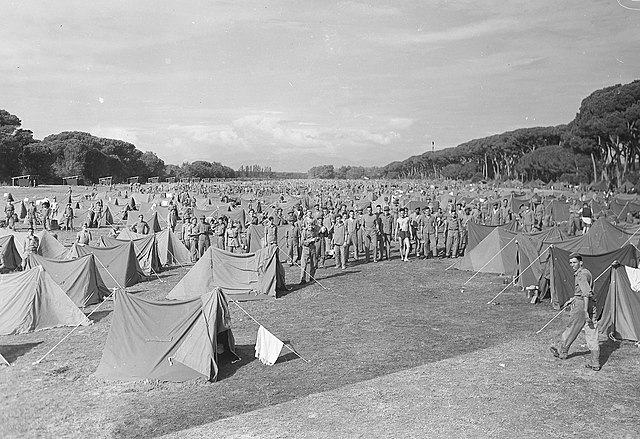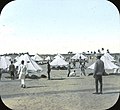Top Qs
Timeline
Chat
Perspective
Military camp
Semi-permanent facility for the lodging of an army From Wikipedia, the free encyclopedia
Remove ads
A military camp or bivouac is a semi-permanent military base, for the lodging of an army. Camps are erected when a military force travels away from a major installation or fort during training or operations, and often have the form of large campsites.[1]

In the British Army, Commonwealth armies, the United States Marine Corps, and other military forces, permanent military bases are also called camps, including Tidworth Camp,[2] Blandford Camp, Bulford Camp, and Devil's Tower Camp of the British Army; and Camp Lejeune and Camp Geiger of the United States Marine Corps.
Remove ads
Background
Historically, army camps referred to large field camps of military troops that could include several thousand people. In the Middle Ages, camp followers (i.e. wives, prostitutes, sutlers, laundresses, craftsmen, blacksmiths, squires, etc.) were also integrated into the camps. The composition varied, depending on whether it was a mercenary army with a few leaders, or large armies with many nobles and knights, such as those of the Crusades.
Remove ads
Leaguer

Leaguer and harbour are British terms for military camps; 'harbour' for temporary camps. The name, coming from 16th Century Dutch leger,[3] was used for a military camp, particularly one laying siege.
During World War II leaguer was used in the Western Desert campaign particularly for camps of armoured formations.[4] The arrangement of the leaguer depended on purpose and whether day or night. By day dispersed for protection against air attack with elements of the formation able to cover each other, at night ("close leaguer") the tank regiment forming a square or triangle, the tanks facing out with the support vehicles drawn up in the middle (but moving out of the leaguer and to the rear just before dawn). [5]
Remove ads
Other uses
The term "bivouac" also has non-military uses. In the Rhineland carnival tradition, "bivouac" refers to an open-air carnival, usually organized by a carnival society. A well-known example is the "Funkenbiwak" organized by the Rote Funken carnival society, which takes place on the Neumarkt square in Cologne.[6]
Gallery
- Scenes of the Austrian War of Succession, 1741-1745
- Scenes of the Austrian War of Succession, 1741-1745
- Military camp at Conwy on the North Wales coast, 1911
- Egypt - military camp, Wadi Halfa. Brooklyn Museum Archives
- Military camp at Bagram, Afghanistan home to U.S. airmen, soldiers, Marines and sailors supporting Operation Enduring Freedom
- A group in camp, 39th Bengal Infantry
Remove ads
See also
Bibliography
References
External links
Wikiwand - on
Seamless Wikipedia browsing. On steroids.
Remove ads







